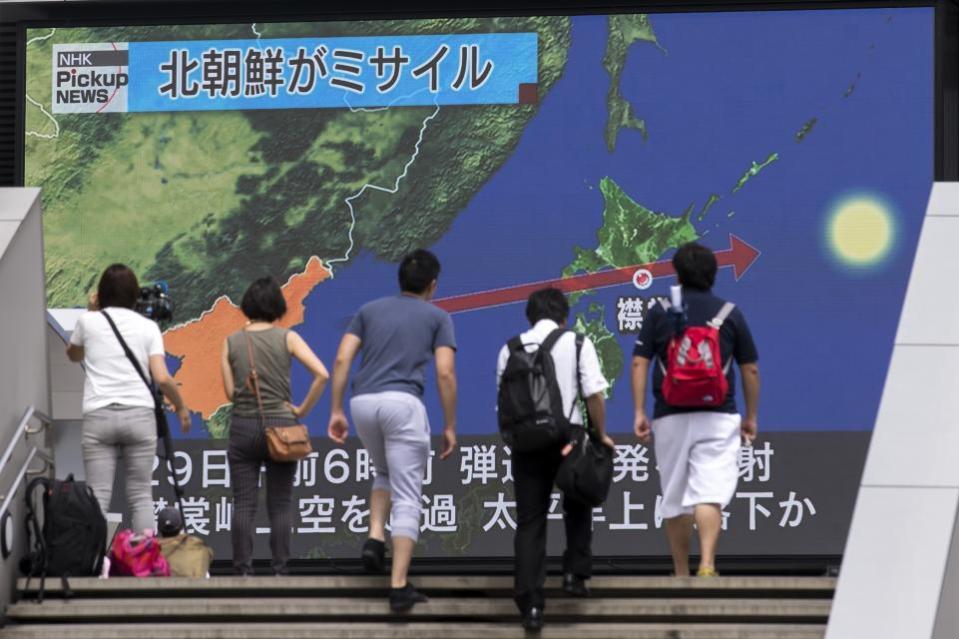North Korea Threatens to 'Sink' Japan With Nuke
North Korea has threatened to use a nuclear weapon against Japan, as part of a series of threats against the U.S. and its allies in Asia-Pacific.
The Korea Asia-Pacific Peace Committee, a North Korean organization affiliated with the ruling Workers' Party that handles the country's external ties and propaganda and regularly uses inflammatory language in its releases, issued a statement Thursday claiming to speak in the name of the Korean people and army in condemning the newly-imposed U.N. Security Council sanctions against the country.
Having previously stated that North Korea was watching the U.S. actions and warned of unspecified retaliation against new sanctions, the committee statement branded the Security Council “a tool of evil,” and claimed: “Now is the time to annihilate the U.S. imperialist aggressors. Let's reduce the U.S. mainland into ashes and darkness.”
Japan, the statement said, is next in the line of threat firing due to its “enraging behavior.”
“The four islands of the archipelago should be sunken into the sea by the nuclear bomb of Juche," the statement said, referring to North Korea's founding Juche ideology of self-reliance, adding: "Japan is no longer needed to exist near us."
Both Japan and the U.S. have a seat on the Security Council. The U.S. is a permanent member with veto power along with the U.K., France, Russia and China. But the North Korean statement did not mention any of these other powers, turning instead against the neighboring South.
“The South Korean puppet forces are traitors and dogs of the U.S. as they call for ‘harsher sanctions’ on the fellow countrymen. The group of pro-American traitors should be severely punished and wiped out with fire attack so that they could no longer survive,” the statement read, before concluding that the country will keep pursuing “self-defensive nuclear force.”
Despite the threats, the South Korean government plans to channel $8 million in aid to North Korea via international organizations. "The government's basic stance is that humanitarian assistance to those who are vulnerable in North Korea should be continued regardless of political considerations," a ministry official said Thursday, quoted in the country's news agency Yonhap.

The “extremely provocative” comments, as Japanese Chief Cabinet Secretary Yoshihide Suga branded them, sent the Korean won lower, Bloomberg reported.
In official statements, North Korea upholds a hostile rhetoric against Japan, which ruled the Korean pensinula from 1910 until the end of the World War II. In the latest provocation against the former colonial power, Pyongyang flew a missile over the northern Japan island of Hokkaido on August 28, which flew for an estimated 1,680 miles, reaching an altitude of about 340 miles before breaking up in three pieces and landing in the Pacific.
The threat comes days after Japanese former pro-wrestler and now independent lawmaker Antonio Inoki returned from a visit to Pyongyang, in which he conveyed the ruling Japanese Liberal Democratic Party's wish to send a delegation of MPs to North Korea. The request, Inoki said, had elicited a positive response, as the Japan Times reported.
“If North Korea stays the course that it is on, it will increasingly become isolated from the world,” Suga told reporters in Tokyo. “Through implementing the new United Nations Security Council resolution and related agreements, the international community as a whole needs to maximize pressure on North Korea so that it will change its policy.”
The sanctions introduce a ban on North Korea’s textile exports, the country’s second-largest export sector after coal and other minerals, which were targeted in a previous round of sanctions in August.
The sanctions also ban the supply, sale or transfer of all condensates and natural gas liquids, impose a cap of 2 million barrels a year on refined petroleum products, cap crude oil exports to North Korea at current levels and freeze the assets of four high-ranking North Korean officials, but not Kim Jong Un himself, as the U.S. originally intended. According to Reuters, the U.S. also dropped a proposed oil embargo under pressure from China and Russia.
On Tuesday, President Donald Trump expressed doubts on the resolution’s efficacy, describing the sanctions as “not a big deal” and “nothing compared to what ultimately will have to happen.”
Related Articles


